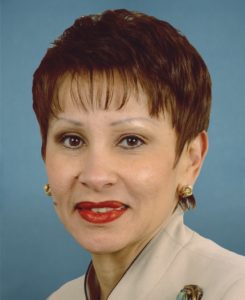Jose Luis Fernandez, a fresh young face in a new generation of successful New Yorkers from Puerto Rico, has made equal rights for U.S. citizens back home on the island an issue in his challenge to old-guard incumbent Nydia Velazquez. She is also a Puerto Rican, and has represented New York’s 7th Congressional District for over two decades.
A new generation of Americans from Puerto Rico with new energy and ideas is challenging the old order of Puerto Rican leaders on the mainland who defend the denial of equal rights of citizenship to Puerto Ricans living back home on the island.
Jose Luis Fernandez rejects the idea that Puerto Ricans in the mainland who have full rights and duties of citizenship should oppose self-determination and government by consent in Puerto Rico, just to preserve the privileges and entitlements of special interests still prospering under the failing political and economic regime imposed in federal territories. Territorial status is a temporary arrangement historically limited to territories incapable of statehood or independence.
Puerto Rico was ready for statehood at the same time as Alaska and Hawaii, but was denied admission to the union due to intermeddling by mainland and local corporate special interests, resulting in economic stagnation under territorial exploitation while Hawaii and Alaska saw the growth of prosperity Puerto Rico will not experience until it becomes a state.
 Velazquez is an aging poster child for the tired old generation of transplanted Puerto Ricans who thrived politically decades ago on campaign contributions from mainland corporations profiting from federal tax shelters in Puerto Rico. These corporations benefited from the territorial status of Puerto Rico, and Velazquez lives in a state and therefore has been able to overlook the nagative effects on the people of Puerto Rico. She clings to power on an agenda leveraged by support from corporations which exploit and therefore want to preserve the current territorial status.
Velazquez is an aging poster child for the tired old generation of transplanted Puerto Ricans who thrived politically decades ago on campaign contributions from mainland corporations profiting from federal tax shelters in Puerto Rico. These corporations benefited from the territorial status of Puerto Rico, and Velazquez lives in a state and therefore has been able to overlook the nagative effects on the people of Puerto Rico. She clings to power on an agenda leveraged by support from corporations which exploit and therefore want to preserve the current territorial status.
Velazquez naturally is also supported by the local party in Puerto Rico which wants to maintain territorial status — whether because they believe the myth of enhanced commonwealth or because they benefit from it in their political positions.
Her political and corporate cohorts in New York and Puerto Rico do not want voters to be allowed to choose full national citizenship, which can only be achieved through statehood or independence. Puerto Rico now is a federal reservation under territorial law with limited special rights which can be given and taken away at the pleasure of a Congress in which the 3.7 U.S. citizens of Puerto Rico have no voting representation. Velazquez is an aggressive supporter of this shameful situation.
Jose Luis Fernandez has generated a new awareness of how far Velazquez will go to sell out her fellow Puerto Ricans’ right of democratic self-determination. He has pointed out her alliance with the U.S. Senator from Mississippi, Roger Wicker.
Puerto Rico is more ready for statehood today than Mississippi was when it became a state, yet it is ruled by the Congress in which Senator Wicker serve under the U.S. flag and federal law without full rights and protections of the U.S. Constitution.
Wicker and Velazquez are miles apart politically, but they are united in their desire to placate corporate interests at the expense of the people of Puerto Rico. Together Wicker and Velazquez have made vociferously anti-democratic arguments against any political status vote that does not include continuation of the status quo, even after the current territorial regime was rejected by a clear majority of voters in 2012.
For his part, there seems to be nothing Wicker will not say or do to prevent the voters in Puerto Rico from being given the choice to become full U.S. citizens with the same rights citizens in his state enjoy. While Wicker would prefer for Puerto Rico to become an independent nation and just go away, since voters reject that option he and Velazquez support continuation of the status quo as the best tactic to delay and prevent the possibility of statehood.
Velazquez has denied the legitimacy of the 2012 referendum, in which the voters overwhelmingly rejected the status quo and chose statehood. Luis Fernandez calls her out for her anti-democratic ideology. The Queens New York Times-Ledger on October 27 quoted Fernandez as saying,
She has been utilizing her influence in Congress to deny rights to U.S. citizens in Puerto Rico. This is the same congresswomen who is promising to defend the rights of Hispanics and other immigrant groups… but if she is denying rights to her own people, what kind of hope can we have?
In their attack on the 2012 referendum, Velazquez and Wicker reject the status referendum results certified by the Puerto Rico Election Commission. They claim that Congress should ignore the results of the first ballot question in which 54% voted to end the current territorial status. They also argue that ballots left blank on the second question in which 61% chose statehood over nationhood should be counted as votes against statehood.
There were no allegations of irregularities in the actual voting process, and there is no legal basis in local or national election law for assigning any meaning to blank ballots. In fact, there abeen cases in the past in which counting blank ballots would have meant denial of admission to the union for territories that became states based on votes closer than Puerto Rico’s. The U.S. and United Nations also rejected attribution of legal meaning to blank ballots in plebiscites to approve treaties of alliance between the U.S. and three former U.S. governed territories in the Pacific.
These legal precedents expose the fallacies of Velazquez’ opposition to a federally recognized vote to confirm the 2012 results, as approved by Congress and the White House in January of 2014. Instead, Velazquez and Wicker are overseers on the territorial plantation, where disenfranchised citizens are treated generously in many ways, but suffer the tyranny of being without a say in the law and government under which they live.
Do you have something to say to Velazquez or to your legislators? Contact your representatives now — we make it easy.
This post was originally written in English and may be being auto-translated by Google.








No responses yet